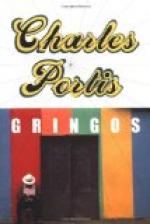Here, because of certain traits which led each man to seek the thing that pleased him best, the trail forked for a time. One was caught in the turgid whirlpool which was the sporting element of the town, and would not leave it. Him the games and the women and the fighting drew irresistibly. The other sickened of the place, and one day when all the grassy hillsides shone with the golden glow of poppies to prove that spring was near, almost emptied a bag of gold because he had seen and fancied a white horse which a drunken Spaniard from the San Joaquin was riding up and down the narrow strip of sand which was a street, showing off alike his horsemanship and his drunkenness. The horse he bought, and the outfit, from the silver-trimmed saddle and bridle to the rawhide riata hanging coiled upon one side of the narrow fork and the ivory-handled Colt’s revolver tucked snugly in its holster upon the other side. Pleased as a child over a Christmas stocking, he straightway mounted the beautiful beast and galloped away to the south, still led by Chance, the jester.
He returned in a week, enamored alike of his horse and of the ranch he had discovered. He was going back, he said. There were cattle by the thousands—and he was a cattleman, from the top of his white sombrero to the tips of his calfskin boots, for all he had bent his back laboriously all summer over a hole in the ground, and had idled in town since Thanksgiving. He was a cowboy (vaquero was the name they used in those pleasant valleys) and so was his friend. And he had found a cowboy’s paradise, and a welcome which a king could not cavil at. Would Jack stake himself to a horse and outfit, and come to Palo Alto till the snow was well out of the mountains and they could go back to their mine?
Jack blew three small smoke-rings with nice precision, watched them float and fade while he thought of a certain girl who had lately smiled upon him—and in return had got smile for smile—and said he guessed he’d stick to town life for a while.
“Old Don Andres Picardo’s a prince,” argued Dade, “and he’s got a rancho that’s a paradise on earth. Likes us gringos—which is more than most of ’em do—and said his house and all he’s got is half mine, and nothing but the honor’s all his. You know the Spaniards; seems like Texas, down there. I told him I had a partner, and he said he’d be doubly honored if it pleased my partner to sleep under his poor roof—red tiles, by the way, and not so poor!—and sit at his table. One of the ‘fine old families,’ they are, Jack. I came back after you and my traps.”
“That fellow you bought the white caballo from got shot that same night,” Jack observed irrelevantly. “He was weeping all over me part of the evening, because he’d sold the horse and you had pulled out so he couldn’t buy him back. Then he came into Billy Wilson’s place and sat into a game at the table next to mine; and some kind of a quarrel started. He’d overlooked that




